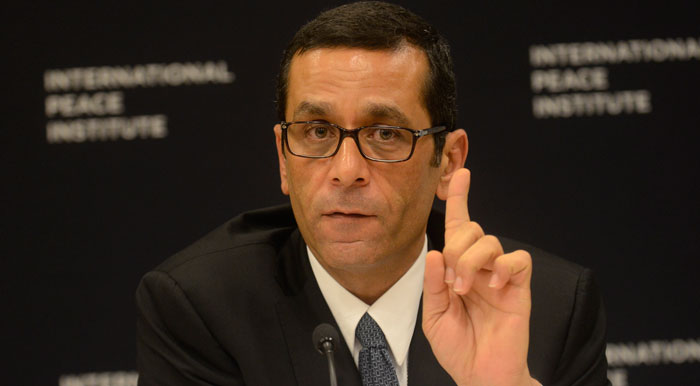
“Our experience in Darfur has shown that the best partners we have are the women,” Amer Daoudi, Regional Director for Sudan at the World Food Programme (WFP) told an IPI audience on May 23, 2012. “You go around the camps, the villages… it is the women who are doing all the work. We saw an opportunity there to empower them, to give them a stronger hold on income, to manage households.”
In a panel organized along with the WFP on Resilience, Crisis, and Food Security, Mr. Daoudi outlined his agency’s disaster and early recovery work, drawing from his experience in Darfur.
“For us, building resilience means moving from managing crisis to managing risk. That has been our focus,” he said. WFP’s approach to combating food insecurity in Darfur, he said, has focused on bringing the local community together, including insisting on 50 percent women representation, academics, and government to discuss the issues facing that community. Together, he said, these stakeholders come up with solutions to eventually graduate them from WFP’s assistance. “We start the projects like that, giving them ownership of those projects,” he said.
“What we are doing is WFP-type activities basically dealing with the local communities, empowering the local communities, giving them the ownership, but it needs to go beyond,” he said. “I believe that if we all come together, the cost-effectiveness of these types of interventions is shown in every WFP budget for Sudan over the past three years.”
Mr. Daoudi spoke of the shift in the type of assistance that has taken place over time. Instead of direct food assistance, WFP focuses on a voucher program that generates local income and improves local production. Darfur is not just an emergency anymore, he said, as thirty percent of WFP’s programs are now in early recovery.
Speaking about IDPs, Mr. Daoudi explained that half of the three million people WFP assists there are in IDP camps. He said that they do not expect more than 40 percent of these IDPs to return, since many camp residents have found jobs in the urbanized camps, and settled there.
Ultimately, he said, the WFP is not the answer to all the problems, that partnerships, with government, local and external actors, are important, and that as humanitarians, they can engage in political solutions.
Also speaking on the panel were Dr. Sarah Cliffe, Special Adviser and Assistant Secretary-General at the UN on the Civilian Capacities Project, and Marwan Jilani, Head of the International Federation of Red Cross and Red Crescent Societies’s (IFRC) delegation to the UN.
Dr. Cliffe spoke about how to combine short-term humanitarian objectives and long-term institution building. “Resilience has a key link to conflict,” she said. “We know that societies that have stronger institutions…also tend to have less likelihood of food shocks or natural weather events increasing the likelihood that they will have social unrest or social conflict, so in that sense this institution building is crucial.”
She said that previously programs were run by importing supplies and staff which did not leave any institutional legacy for weathering the next crisis. As such, there is now a move from broad to targeted assistance which makes sure delivery of direct food does not undermine local traders and markets.
Further, she applauded working with local communities, calling it crucial as it creates a governance space, “in a place where there have not always been such good examples of governance at a local level.”
Mr. Jilani spoke about the experience of IFRC in responding to last year’s drought in Kenya, the worst in sixty years. He outlined how the Kenyan Red Cross supported and trained farmers during the drought, placing it in a longer-term context where droughts and flood over the past decade have hurt the poorest in Kenya.
“Long-term investments in food security and resilience-building can be highly cost-effective and have a profound impact in saving lives when disasters strike,” he said. “IFRC’s understanding of resilience takes a comprehensive and integrated approach, reducing risk, and improving capacity. It is in part about bridging the gap between development and humanitarian approaches.”
Much work remains to be done, he concluded. “I think we have not reached a point where we are systematically using resilience as a tool to measure our programs or assess our programs and interventions in building the resiliency of communities,” he said, “but there is work among different organizations to start doing that, and to build their programs based on the concept of resilience.”
The event was moderated by Warren Hoge, IPI Senior Adviser for External Relations.
Interview with Amer Daoudi, Regional Director for Sudan, World Food Programme
Watch event:







